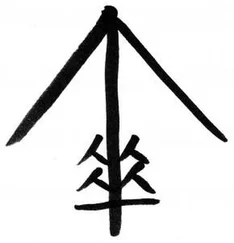And now that I have to commit to a Buddhist vegetarian diet, I miss the restaurant at Beixinqiao where they serve chitterlings soup made from ancient stock that has supposedly been accumulating flavor for years.
I’ve canceled my mobile number and deleted all my accounts on social media; my wife has left me and returned to her hometown; I’ve even been given a Dharma name: “Chenwu”—“Free of Worldly Dust.” All I want is for those crazy people to never find me again.
I’ve had enough.
Everything began that night with the crazy marketing scheme that seemed to make no sense.
Mr. Wan bought my idea. Overnight he summoned the engineers to develop the new product. Lao Xu laid out the marketing plan and strategy. The most important piece of the project, of course, was assigned to me, the originator.
I had to go find a respected master monk willing to consecrate our app, to bring it light.
Lao Xu demanded that the entire process be filmed and turned loose online to go viral. I ran through every excuse I could think of: My family have been Christians for three generations; my wife is pregnant and can’t come in contact with raw foods, animal fur, or anything having to do with spirits….
Lao Xu responded with only one line: This is your baby. If you don’t want to see it through, get out and don’t come back, you get me?
I visited every temple in Beijing, begging and pleading with the master monks, and I sought out every lama secluded in spiritual solitude in the city’s various nooks and crannies. Each time, however, even after having come to an agreement on the price, as soon as I brought out my camera, the monks’ faces turned stony, and after a few “Amitabha,” they would cover their faces and escape my presence.
We tried using hidden cameras a few times, but the combination of incense haze and camera shake made the results unwatchable.
As the deadline approached, I could no longer sleep, but tossed and turned all night. My wife asked me what I was doing.
“Rolling dough for pancakes,” I said.
She kicked me. “If you want to do that, get on the floor. Don’t pretend you’re a rolling pin in bed. I’m trying to sleep.”
The kick managed to free my clogged neural pathways. Instantly, I was inspired.
Mr. Wan’s new app went on sale on time. Lao Xu, energized like his Land Rover, shifted into high gear and whipped us into a frenzy. Videos, new concepts, and new campaigns were released one after another. Soon, a video depicting a master monk consecrating a mobile phone went viral, and Buddhagrams began to conquer Weibo and WeChat. The number of downloads and daily engagement level rose exponentially like rockets heading for the clouds at escape velocity.
Don’t ask me the impact of such growth on the long-term brand value; don’t ask me what this meant for the subsequent development and application of the digital watermark technology. Those are problems Mr. Wan had to solve. I was only a strategist for a third-rate marketing company who had some crazy ideas. I could only work on problems that I was capable of solving with my own methods.
In the end, we underestimated the creativity of users. It turned out that Buddhagram pictures, due to the presence of the watermark, could be recovered from even low-resolution copies or cropped fragments. This meant they could be shared and forwarded without taking up much bandwidth or time. Trying to take advantage of the situation, we released a series of new ads touting this newly discovered advantage.
Downloads spiked again, but no one anticipated what happened next.
It started with a picture of an apple taken with Buddhagram. A week later, the poster shared a second picture of the same apple: it was apparently rotting at a much slower rate than other apples.
Next came the various pictures of pets that miraculously recovered their health after having had their pictures taken with Buddhagram.
Then, an old lady claimed that after she had taken a Buddhaselfie, she managed to survive a deadly car accident.
Rumors multiplied. Taken individually, each seemed some preposterous April Fool’s joke, but behind every story stood a witness who swore it was true, and the number of believers snowballed.
The posts grew stranger. Patients with terminal cancer posted selfies showing their tumors diminishing daily; couples who had trouble conceiving took nude selfies and became pregnant; migrant laborers took group selfies and won the lottery. The kind of news that one would normally expect to find only on tabloids on the subway filled every social media platform. All the pictures had the Buddhagram watermark, and all of us thought they were from astroturfers hired by the company.
We thought wrong.
Supposedly, Mr. Wan’s phone was ringing nonstop with calls from interested investors. Other than asking about a chance to invest, the next most popular question was: Who is the master monk who brought light to the app?
The logic was simple: if a consecrated mobile app could have such magical effects, then asking the monk himself to perform some rite would surely result in earthshaking miracles. The investors thought of this, and so did millions and millions of users.
In this age, truth was as rare as virtue. Even more tragic, when faced with the truth, most people preferred to doubt its veracity because they would rather believe the truthy mirage created by their own minds.
Soon, my contact details were leaked. Email, phone, text…. Everyone screamed the same question at me: Who is the master monk???
I refused to answer. I knew they would figure it out sooner or later.
Crowdsourcing the search, they finally managed to locate the master monk and the disciples in the viral video—a bunch of actors my friend had found for me among the crowd of extras congregated at Hengdian World Studios, hoping to get a role. They were supposed to portray commoners during the Qing Dynasty, which meant they were already shaved bald—just like Buddhist monks. This made negotiations rather easy. The extras who harbored dreams of making it big in the movies were especially diligent, and the lead even argued with the makeup artist over the correct placement of the burn marks over his head to indicate his ordained status. Watching the scene, I grew concerned.
They were all good people. The fault was entirely mine.
The poor actors who had been located by the “human flesh search engine” could no longer live in peace. The enraged netizens hounded them and their families using the vilest language, forcing them to acknowledge what was obviously true: they were mere extras hired by the company to portray the master monk and his disciples.
Except that the crowd still wasn’t quite on the same page as me: they continued to believe that my company—or more precisely, I—was hiding the real master monk. Out of greed or selfishness, I was refusing to disclose his identity to the public so that everyone could benefit from the master’s powers.
I really wasn’t.
Lao Xu closed the company temporarily. Every day, groups of middle-aged women congregated at the foot of the building, holding up protest banners. Even if we could endure the pressure, the building’s property manager couldn’t. Lao Xu put us all on paid leave, hoping that the storm would quickly blow over. Kindly, he told me that it was best for me to leave the city and return to my parents’ home for a few days. It was just a matter of time before one of the netizens who was terminally ill might arrive at my door with his family, pleading with me to give up the master monk’s WeChat ID.
I realized that Lao Xu was right. I couldn’t put my family at risk.
And so, after I settled my affairs, I came to this ancient temple to become a grounds sweeper.
Читать дальше












